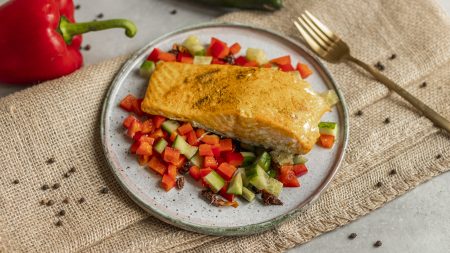
Fat – Enemy or Ally of Health?
Researchers have been studying the impact of diet on health for many years. The results clearly show a significant relationship between what we eat and the risk of diseases of civilization such as obesity, diabetes, hypertension, and cancer. And what effect do fats have on all this? This will be the basis of this text.
I often come across two extreme positions in the approach to fats in people who start their adventure with healthy eating. I get questions like this one “Lewa, what should I do about fats, eat them or cut them out?” almost every day.
Years of trends for low-fat diets along with revelations telling us that fats are evil, as well as contradictory claims about the benefits of high-fat diets, such as the Atkins diet, that promote excess amounts of animal fat, have been confusing for a lot of people. No wonder! Biased articles often provide extreme information and do not consider a holistic approach to the subject. Meat producers will sponsor research and marketing content promoting the consumption of meat or cold cuts, and margarine or oil producers will present opposing views. Hence my appeal to you! Choose your sources of information carefully and don’t be afraid of fats!
Like other nutrients, fats are essential, they provide us with kilocalories, more precisely, 1 g of fat is 9 kilocalories (for comparison, proteins and carbohydrates are 4 kilocalories). Fats should constitute 30% of the energy value of your daily requirement, i.e. for a woman with a demand of about 2000 kcal, the minimum amount of fat in the diet is about 67 g per day. Remember that you don’t put on weight simply because of eating fat, and unfortunately I often see that this myth is still present. You gain unwanted weight when you consume more calories than you can expend. So whether you overeat protein, carbs, or fats, you will accumulate body fat. It is also worth mentioning here that a certain level of body fat is necessary for you and striving for too extreme values can cause various types of complications, which I will describe below.
It’s not just the nutritional value that counts. Both fat and cholesterol are components of the diet, which, apart from the energy function, play an equally important role in the body as a regulator of many physiological processes, e.g. they are a building component of cell membranes and some hormones, they are a solvent for fat-soluble vitamins: A, D, E, K. They also help maintain a constant body temperature and protect internal organs. Adipose tissue in appropriate amounts is also an organ that secretes hormones. Low-fat diets not only lead to a deterioration of the condition of our skin, hair or nails, but also increase the risk of developing hormonal disorders and problems with fertility or the immune system, and in women also the risk of amenorrhea.
It is beneficial for our health to provide the body with the right types of fats, including polyunsaturated fatty acids, which can be found in seeds (flax, chia, pumpkin seeds, sunflower seeds), nuts (walnuts, hazelnuts, pecans, macadamia and others), in olive oil, oils pressed on cold or oily fish.
It is known that a diet characterized by excessive consumption of energy and highly processed foods as well as saturated and trans fats is largely responsible for the epidemic of diet-related diseases. However, fat itself is not the culprit here, but some of its sources, as well as other components of the diet, including excess simple sugars or food additives.
Essential fatty acids (EFA) – linoleic acid from the omega 6 group and α-linolenic acid from the omega 3 group are particularly important for health. Their deficiency leads to serious diseases and metabolic disorders. EFAs, through the eicosanoids formed from them, regulate the work of the cardiovascular system, blood pressure, blood coagulability, triglyceride concentration, manage immunity and inflammatory processes. A proper balance of fatty acid groups is important in the diet. The recommended ratio of omega 6 to omega 3 should be less than 5:1. A valuable source of EFAs is our Polish flaxseed as well as walnuts, which you can add, for example, to salads or homemade muesli, and prepare delicious dressings based on oils.
The most beneficial fats from the omega-3 family, rich in two fatty acids that are crucial for the work of your brain, which also have an anti-inflammatory effect, are EPA eicosapentaenoic acid and DHA docosahexaenoic acid. They can be found in sea fish, such as: mackerel, sardine, herring, salmon.

Fish can be steamed, gently grilled in a grill pan or roast. Then you will get the best results and keep the most valuable omega 3 acids. Frying with the addition of vegetable oils containing significant amounts of omega 6 weakens the effect of omega-3 fats, which makes them lose many of their health-promoting properties. What if you don’t eat fish? Here, I recommend supplementation with omega 3 containing EPA and DHA, which will protect you against deficiencies. If you are looking for omega 3 supplementation, have a look HERE.
The main sources of omega-6 are:
- Sunflower seeds and sunflower oil
- corn oil
- soybean oil
- Evening primrose oil
- Borage oil
What oils are used for cooking?
- Olive oil, walnut oil, avocado oil – these are some of the healthiest vegetable oils. They can be used for very short frying (for longer frying I recommend other oils such as coconut), stewing, cooking and cold. They lower cholesterol, regulate blood sugar levels, and have an antioxidant effect. Cold-pressed extra virgin olive oil is the best.
- Rapeseed oil – the most commonly used frying oil in Poland (but remember that it is always better to choose stewed dishes than fried ones).
- Sunflower, corn, peanut oil – contain significant amounts of omega 6, not suitable for frying or use at high temperatures (e.g. baking).
- Flaxseed oil – should only be eaten cold. It has the highest EFA content among vegetable oils.
Vegetable fats are a very good source of vitamin E, which has a positive effect on the condition of your skin. Good sources of vitamin E are: wheat germ oil 149 mg/ 100 g, sunflower oil 46 mg/ 100 g, safflower oil 34 mg/ 100 g, sesame oil 1.4 mg/ 100 g, olive oil 11 mg/ 100 g, rapeseed oil 29 mg/ 100g.
When writing about fats, it is impossible not to mention saturated fatty acids and trans fats. High consumption of saturated fats and trans fats from animal products, such as fatty meat, cold cuts, full-fat dairy products and highly processed products (fast food, sweets, salty snacks), should be kept to an absolute minimum. We know that saturated fats and trans fats can contribute to the development of cardiovascular diseases, including coronary artery disease, atherosclerosis, or disorders in the body’s lipid metabolism.
Remember that not only the type of fatty acids is important. In the overall assessment of the product and diet in terms of the impact on the lipid profile and health potential, factors such as product quality, the presence of other beneficial ingredients (e.g. polyphenols, plant sterols, vitamins, minerals, fiber) also play a role. Whether a given source of fats will be beneficial for you should also be considered in relation to the way it is used! I will give you some examples:
- Coconut oil – although it contains significant amounts of theoretically unfavorable saturated fatty acids, it is its advantage when it is subjected to thermal processing, e.g. during frying. Many studies show that coconut oil has a positive effect on the level of the so-called good HDL cholesterol, while it may have no effect or slightly increase the level of LDL, the so-called bad cholesterol (research emphasizes that this effect may depend on how many vegetables, fruits or how much fiber the subjects consumed). Coconut oil is considered safe, but we need more research.
- Flaxseed oil – we’ve already mentioned it. Remember that the use of cold oil as an ingredient of dressing, spread for sandwiches or homemade pesto will have a beneficial effect on health, while heating linseed oil causes oxidation of unsaturated fatty acids. Not only heating is prohibited here. Linseed oil is so susceptible to oxidation that it should be properly stored and protected against elevated temperatures, e.g. we do not store it on a sun-lit countertop in the kitchen, but in the fridge, and you should never eat it after the use-by date. The short shelf life of linseed oil results from the changes that occur in it during storage and are unfavorable to health.
In conclusion, fats are an essential part of your diet. Cutting down on them too much is not beneficial. Nevertheless, you should pay attention to the sources of fats and how they are stored. It is worth avoiding saturated fats of animal origin (fat meat and fatty dairy products) and trans fats (fast food, fried products, sweets and confectionery, instant meals such as instant soups), and enrich the diet with vegetable fats (olive oil and oils pressed cold, also nuts and seeds) and oily sea fish. Choose the right types of oils that are appropriately used, e.g. coconut oil for frying and cold flaxseed oil for salads. Remember that diet is not only about fats, many factors determine whether it is healthy or not, such as variety, the amount of vegetables, fruits, fiber, and cuttind down on simple sugars as much as possible. Both in my Diet & Training by Ann app and SuperMenu by Anna Lewandowska catering we pay great attention to the appropriate sources of fat, both when used raw and for thermal processing, so you can be sure your body is provided with all the right nutrients, including healthy fats.
Bibliography
- Dutkowska A., Rachoń D. Rola kwasów tłuszczowych n-3 oraz n-6 w prewencji chorób układu sercowo-naczyniowego. Choroby Serca i Naczyń 2015, tom 12, nr 3, 154–159.
- Makała H. Izomery trans kwasów tłuszczowych w diecie człowieka i ich wpływ na zdrowie. Postępy Nauki i Technologii Przemysłu Rolno-Spożywczego 2020 tom 75 nr 1-2.
- Pawłowska A., Kocur A., Siudem P., Paradowska K. Badanie stabilności oleju lnianego i oleju z czarnuszki. Postępy Fitoterapii 2018, tom 19, nr 3, 157-163.
- Wojda A., Janczy A. Zagrożenie wystąpienia schorzeń sercowo-naczyniowych w aspekcie spożycia nasyconych kwasów tłuszczowych pochodzenia roślinnego i zwierzęcego. Medycyna Ogólna i Nauki o Zdrowiu 2021, tom 27, nr 2, 99–106.









Comments No Comments
Join the discussion…